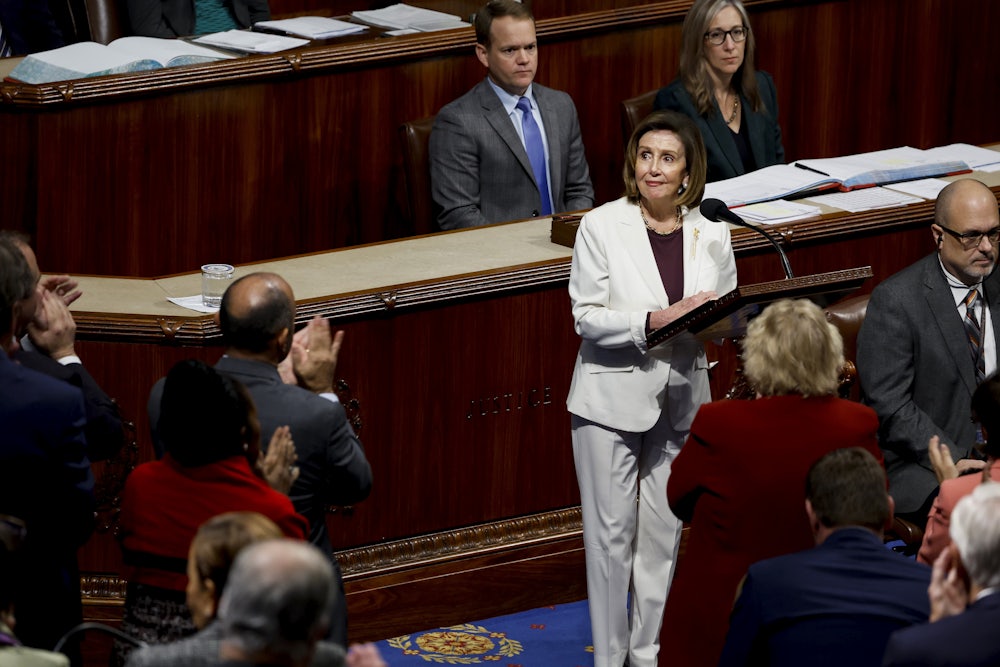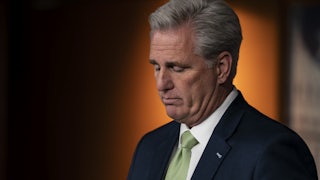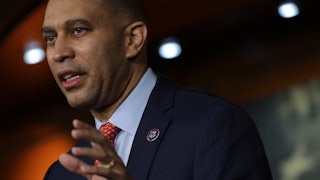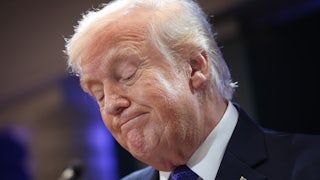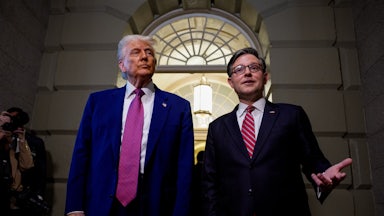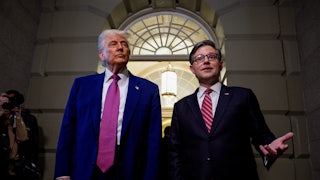Nancy Pelosi will long be remembered as the first female speaker of the House, as adept and stylish as anyone who has ever held that office. But her most consequential achievement was one that has largely fallen out of the lexicon of American politics: She was a brilliant party builder.
The 18-term congresswoman from San Francisco understood both the breadth and the fragility of the Democrats’ coalition—spanning progressives in deep-blue districts to moderates in swing ones—at a ferociously partisan time when neither party dominates our politics for long. Pelosi spent two decades as a leader of Democrats in the House—rising from whip to minority leader to speaker. Her legislative accomplishments are legion. She steered her unruly caucus to victories that enabled her party to enact landmark bills that regulated Wall Street, extended health care protection to millions of Americans, abolished discrimination against gay men and lesbians in the military, and will help curb climate change.
But, like earlier American party builders (all of whom were men), her ideological ardor always paled in comparison to doing what she deemed necessary to take power and hold it. In the 1820s, New Yorker Martin Van Buren cajoled Southern planters and artisans and small farmers from the North to put their sectional differences aside to create what they first called “the Jackson Party”—after Andrew—and then “The Democracy.” At the turn of the twentieth century, Mark Hanna combined high tariffs, a willingness to negotiate with unions, and massive funding from industrialists to turn the Republicans into the majority party. During the 1930s, Senator Robert Wagner and labor leader Sidney Hillman persuaded steelworkers and store clerks alike that the Democrats were true champions of the wage-earning class—a reputation that did much to keep their party in control of Congress and the White House for three decades, with few interruptions.
After Al Gore’s painfully narrow loss in 2000, Pelosi complained to a longtime ally, “You know what? I don’t think these boys know how to win.” The party, she recognized, would not be able to sustain electoral victories unless it became both a unified and well-financed institution. Pelosi raised large donations for Democrats of every persuasion and worked harder and more successfully at that unloved task than did any of her colleagues. During the 2002 election cycle, she spent long days and nights on the road taking in more than $7 million for House candidates and created two PACs of her own. Later, as speaker of the House, she attended hundreds of events with potential donors each year. Between 2018 and 2020, she raised more than $225 million. When a staff member questioned her exhausting pace, the tireless senior citizen responded, “I don’t do downtime.”
Along the way, Pelosi managed to straddle the progressive views of districts like hers with the exigencies of candidates who had to run in places where it was an insult to be labeled a “San Francisco Democrat.” As a party builder, Pelosi cared less about whether a candidate agreed with her on any particular issue than whether they were a good fit for the district. “Pelosi doesn’t begin by asking what kind of world we want,” wrote New York Times columnist Michelle Goldberg in 2020. “She asks where the votes are.” The congresswoman thus backed LGBTQ and abortion rights and the Affordable Care Act—positions nearly all Democrats supported—but resisted proposals like Medicare for All and the abolition of U.S. Immigration and Customs Enforcement that only progressive members of her party favored.
That such stands—and the cultivation of wealthy donors—made her a target for critics on both right and left seems not to have bothered Pelosi at all. After she spearheaded the Democrats’ recapture of a House majority in 2018, 15 members of her caucus voted against her for speaker; most had just won close contests against GOP incumbents and vowed, if elected, not to back the leader of their own party. But Pelosi celebrated their victories anyway and did not take offense, at least publicly, at their refusal to support her. The speaker may even have admired them for doing what it took to win.
It’s not clear if the Democratic leaders who follow Pelosi will emulate her partisan pragmatism or whether that is the best way to secure future victories for their party. Her predecessors built on more favorable terrain: Van Buren’s coalition benefited from universal suffrage for white men, and Hanna’s from the rapid growth of manufacturing. That pro-corporate Republicans held power at the onset of the Great Depression made it easier for Wagner and Hillman to argue that workers should side with the only major party whose backing for unions boosted both their wages and their job security.
But contemporary Democrats face a more difficult challenge, both of demography and principle. They need to win back or win over white voters without a college education as well as those working-class Hispanics whose mistrust of left-wing cosmopolitan elites leads them to choose the GOP. But Democrats have to do that without alienating the young progressives of all races who are the activist heart of the party and care deeply about transgender rights, police violence, and welcoming migrants who cross the border to flee poverty and state oppression. A mass revival of labor unions, which most Americans favor, could appeal to both constituencies. But so far, the upsurge has been quite modest, limited mostly to college-educated workers at places like Starbucks and a few Amazon warehouses.
Still, the Democrats must adopt some of Pelosi’s methods if they hope to become a majority party that can “promote the general welfare” of Americans, as the Constitution pledges. As during the Jacksonian era and the New Deal, they will win consistently only if their candidates, officeholders, and activists debate their differences without one side denouncing or seeking to purge another. Given the current state of campaign finance law, Democrats will also have to keep raising obscene amounts of money to let voters know what they stand for and why.
They might take political lessons from a deceased member of the Pelosi family: the speaker’s mother and namesake. Annunziata—or “Big Nancy”—was married to Thomas D’Alesandro Jr., a high school dropout whose Italian heritage and New Deal politics won him five straight elections to Congress from Baltimore and then 12 years as the city’s mayor. Annuziata spent most of her days performing the kind of essential, unglamorous work to which most political women were restricted in the years before the feminist wave of the 1960s and ’70s. In campaign season, she oversaw precinct walkers and, according to her daughter’s biographer Molly Ball, always “knew whom to call at the Housing Authority, the public hospital, or the county courthouse” for a voter who needed help.
But Big Nancy was a woman of strong principle as well as a master of everyday politics. She regarded every conservative Republican as her foe. In 1984, she angrily rebuffed one of Ronald Reagan’s staff members, who wanted her husband, long retired by then, to appear with the president at an event in Baltimore. “After what he has done to poor people,” snapped Nancy Pelosi’s mother, referring to Reagan’s deep cuts in welfare programs, “he should not come near our house.” After hanging up the phone, she plastered her windows with posters for Walter Mondale. Her hapless candidate got swamped at the polls that fall, but Annunziata D’Alesandro made sure everyone in Baltimore knew what side they should be on.
Hakeem Jeffries and the other younger Democrats who will be leading their party’s caucus come January would do well to emulate how their outgoing octogenarian boss did her job. Building and rebuilding a party is hard work: One must balance the often contradictory demands of politicians in a broad coalition while boosting policies that will expand it—and hustling constantly for the donations that fuel campaigns. Without progressive goals, Democrats lack the power to inspire. But only with the skills of a Nancy Pelosi can they win the power to transform the nation.
